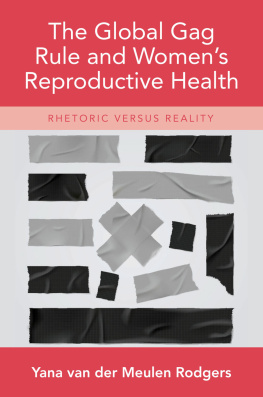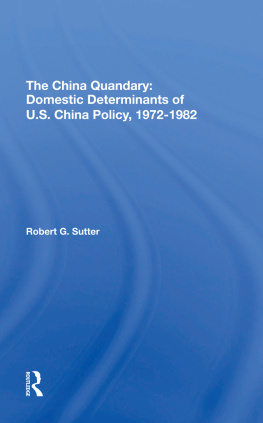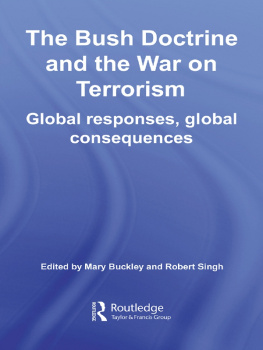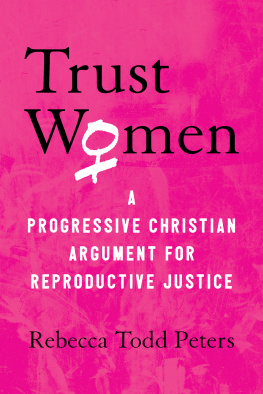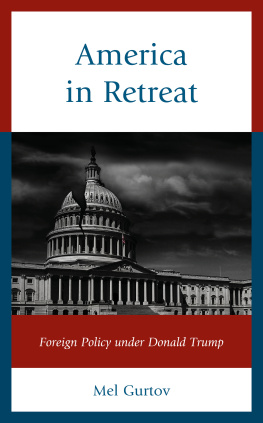THE GLOBAL GAG RULE AND WOMENS REPRODUCTIVE HEALTH

Oxford University Press is a department of the University of Oxford. It furthers the Universitys objective of excellence in research, scholarship, and education by publishing worldwide. Oxford is a registered trade mark of Oxford University Press in the UK and certain other countries.
Published in the United States of America by Oxford University Press
198 Madison Avenue, New York, NY 10016, United States of America.
Oxford University Press 2018
All rights reserved. No part of this publication may be reproduced, stored in a retrieval system, or transmitted, in any form or by any means, without the prior permission in writing of Oxford University Press, or as expressly permitted by law, by license, or under terms agreed with the appropriate reproduction rights organization. Inquiries concerning reproduction outside the scope of the above should be sent to the Rights Department, Oxford University Press, at the address above.
You must not circulate this work in any other form and you must impose this same condition on any acquirer.
Library of Congress Cataloging-in-Publication Data
Names: Rodgers, Yana van der Meulen, author.
Title: The global gag rule and womens reproductive health : rhetoric versus reality /
Yana van der Meulen Rodgers.
Description: New York : Oxford University Press, [2018] |
Includes bibliographical references and index.
Identifiers: LCCN 2018012987 (print) | LCCN 2018026194 (ebook) |
ISBN 9780190876135 (UPDF) | ISBN 9780190876142 (EPUB) |
ISBN 9780190876128 (hardcover : alk. paper)
Subjects: LCSH: AbortionGovernment policyUnited States. | AbortionLaw and
legislationUnited States. | Reproductive rightsUnited States. |
Family planningUnited States. | AbortionGovernment policyDeveloping countries. |
AbortionLaw and legislationDeveloping countries. |
Reproductive rightsDeveloping countries. | Family planningDeveloping countries.
Classification: LCC HQ767.5.U5 (ebook) | LCC HQ767.5.U5 R627 2018 (print) |
DDC 362.1988/800973dc23
LC record available at https://lccn.loc.gov/2018012987
Contents
A number of people have provided invaluable comments and suggestions on this project at various stages of the research and writing. Lee Badgett, Giselle Carino, Don Carroll, Bergen Cooper, Barbara Crane, Nancy Folbre, Sarah Gammage, Mary Hawkesworth, Joel Heisey, Dorothy Hodgson, Marlene Lee, Carl Lin, Jasbir Puar, Shahra Razavi, Vanessa Rios, Charles Schlenker, Barbara Seligman, Diana Strassmann, Siri Suh, and Myra Strober each played an important role in helping the research and the book to take shape. A special acknowledgment goes to Cathy Blackwell, Danny Blitzer, Diane Fay, Victoria Floor, Mary Fowler, Jay Friedman, Debra Grady, Jessica Mazzeo, Billy Rodgers, Charlie Rodgers, and Cathy Wheeler for their help with proofreading and editing, and to Cynthia Daniels for her comprehensive comments on my proposal and research agenda.
I also gratefully acknowledge my home institution, Rutgers University, for granting me a research sabbatical that allowed the much-needed time to work on this project, and for approving my Institutional Review Board application to conduct interviews (IRB Protocol # E18-028). Workshop participants at the Center for Health and Gender Equity, International Center for Research on Women, International Womens Health Coalition, UN Women, International Planned Parenthood Federation / Western Hemisphere Region, and the University of WisconsinWhitewater provided useful comments. Many thanks also to Kanani Kauka at the Kaiser Family Foundation for providing additional descriptive statistics. I am indebted to Eran Bendavid and Grant Miller for sharing with me their detailed methodological appendix and Stata files, which proved instrumental in completing the empirical work. David Pervin provided outstanding guidance and editorial expertise every step of the way. I am especially grateful to Jay Friedman for his incredible support and care during the writing process.
THE GLOBAL GAG RULE AND WOMENS REPRODUCTIVE HEALTH
In recent decades, the long arm of US politics has reached the intimate lives and reproductive health of women all over the world. Since 1984, healthcare organizations in developing countries that provide family-planning services have faced several waves of cuts in US foreign aid. These restrictions originated in a 1984 ruling known as the Mexico City Policy (named after the location of a conference where the policy was first announced) in which the US government would cut off family-planning assistance to any nongovernmental organization (NGO) that performs or promotes abortions as a method of family planning. The ruling, commonly referred to as the global gag rule, prohibits even counseling women on abortion or advocating for the legalization of abortion, thus effectively placing a gag on healthcare providers freedom of speech. It applies only to nongovernmental organizations overseas; foreign governments, multilateral agencies, and US nonprofit organizations are exempt. Most US financial assistance for family planning takes the form of bilateral aid (aid from one country to another) as opposed to funds channeled through multilateral organizations. Thus, with its restrictions on bilateral aid for family planning, the global gag rule is a good example of how the US government can use foreign aid to achieve political objectives.
Since its adoption by President Ronald Reagan in 1984, the policy has remained a hallmark of Republican administrations, with alternating revocations and restorations of the policy by successive US presidents depending on their party affiliation. The global gag rule was rescinded by Bill Clinton in 1993, reinstated by George W. Bush in 2001, rescinded by Barack Obama in 2009, and reinstated again in 2017 under Donald Trump. This policy came on top of legislation in place since 1973 (the Helms Amendment) prohibiting the use of US foreign assistance to pay for abortions as a method of family planning. Under the global gag rule, foreign NGOs cannot even use their own funding for abortion-related activities; they must agree to comply with the policy or their US assistance for family planning is terminated. Not only was the global gag rule reinstated in 2017, it was also dramatically expanded upon previous iterations of the policy. Specifically, the expanded version ends family-planning assistance (which amounts to about $600 million per year) to NGOs that provide abortion services, counsel patients about abortion options, or advocate for the liberalization of abortion laws. It also extends the target of the cuts to all global health funding (a substantially larger pot of about $10 billion per year).
The 2017 reinstatement of the policy has prompted a new round of heated debate in media discourse on the motivation and repercussions of the restrictions on US financial assistance. The commentary has extended across all kinds of media sources and across the political divide, and projected impacts have varied widely. Proponents of the Mexico City Policy point to the importance of reducing the number of abortions globally and preventing foreign organizations from receiving US financial assistance if they perform abortions. For example, the National Right to Life Committee championed the reinstatement of the policy for putting an end to taxpayer funding of groups that promote the killing of unborn children in developing nations ().

